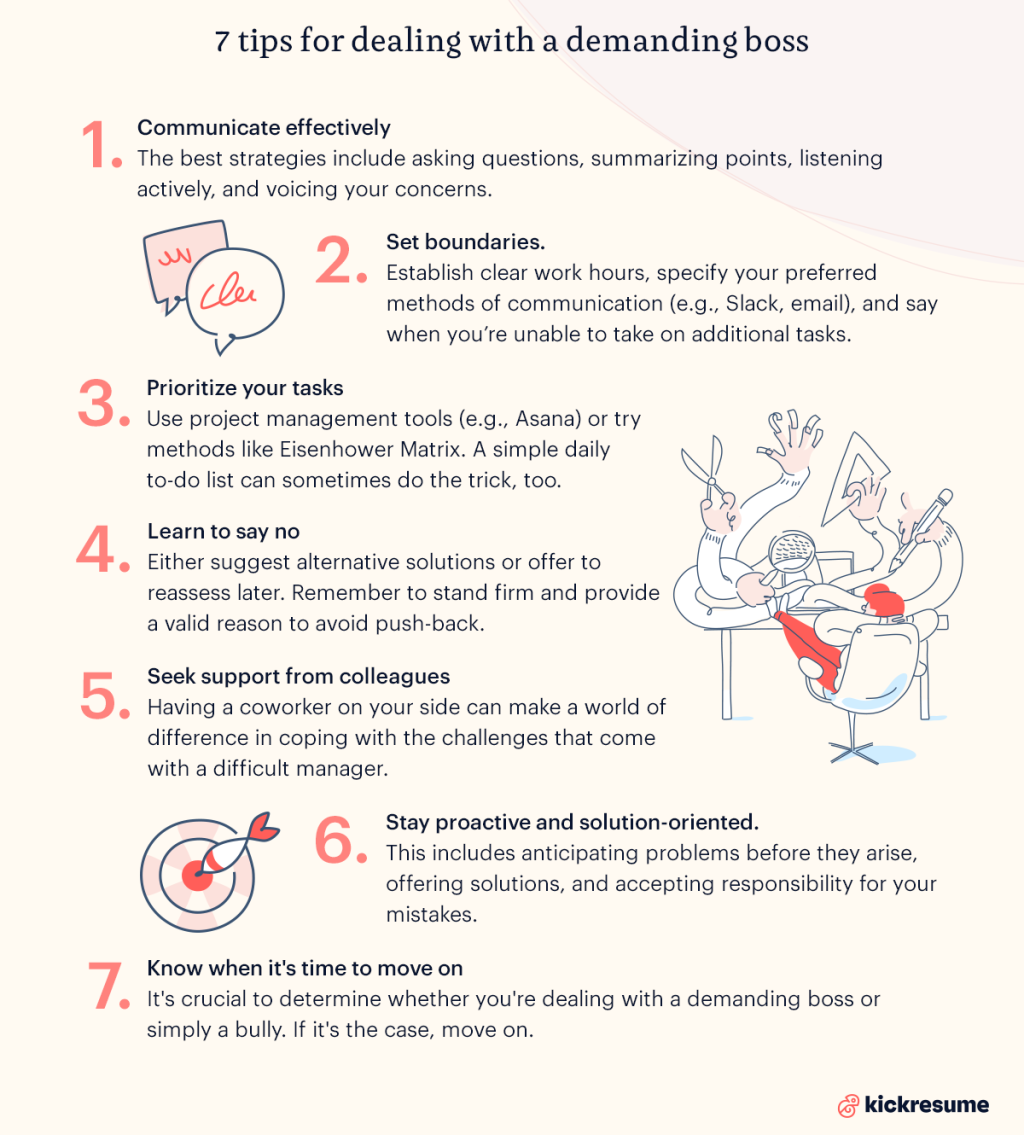Have you ever found yourself feeling overwhelmed and stressed, wondering how to deal with a demanding boss? Rest assured, you're not alone.
While it’s normal for managers to have high standards and ensure their team is performing well, there’s a line that can be crossed.
So, what are the signs of a demanding boss? It’s someone who:
- sets high expectations
- consistently pushes for results
- may even micromanage your work
And once they start to excessively criticize, expect you to consistently sacrifice your personal life for work, or create a toxic work environment, their behavior has crossed into unhealthy territory and should be addressed.
In this article, we’ll give you 7 tips that can help you navigate this tricky terrain to strike a healthier work-life balance and improve your job satisfaction.
Tip 1: Communicate effectively
Clear and effective communication is the foundation for successfully managing a demanding boss.
By ensuring you understand their expectations and they understand your concerns, you can minimize misunderstandings and work together more efficiently.
Here are some strategies to improve communication:
- Listen actively. Give your full attention to your boss when they speak, and show them that you're engaged by nodding or providing verbal affirmations.
- Ask questions. Clarify any unclear points by asking relevant questions, ensuring you fully understand their expectations.
- Summarize key points. After receiving instructions or discussing a topic, briefly summarize the main points to confirm your understanding and agreement.
- Voice your concerns. If you have any doubts, disagreements, or concerns about a task or decision, express them asap and openly with your boss. This can help prevent misunderstandings and ensure that both parties are on the same page.
By implementing these communication strategies, you'll foster a more positive work environment, reduce miscommunications, and ultimately make your demanding boss easier to deal with.
Tip 2: Set boundaries
Setting boundaries will help you maintain a healthy work-life balance and prevent burnout.
By establishing limits, you can ensure that your professional and personal lives don't become entangled, and you can manage your workload more effectively.
Here are some examples of healthy boundaries to set with your boss:
- Work hours. Establish a clear start and end time for your workday, and avoid responding to non-urgent requests outside of those hours.
- Personal space. Maintain a professional distance, keeping personal matters separate from work-related discussions. So, don't be an oversharer.
- Workload. Know your limits and communicate when you're unable to take on additional tasks without sacrificing quality.
- Breaks. Take regular breaks during the workday to recharge and maintain productivity.
- Communication channels. Specify preferred methods of communication (e.g., Slack, Asana, or in-person meetings) to reduce interruptions and maintain focus.
This allows you to be more productive and focused during work hours, leading to a better relationship with your demanding boss and a more enjoyable work experience.

Tip 3: Prioritize your tasks
By focusing on the most important tasks first and making sure your expectations are aligned with your manager’s, you can effectively manage your workload in a way that is a win-win for both parties.
Here are some strategies for prioritizing tasks effectively:
- Use software like Asana. Project management tools like Asana can help you keep track of tasks, deadlines, and priorities, making it easier to stay on top of your workload and maintain alignment with your manager's expectations.
- Eisenhower Matrix. This method helps you categorize tasks based on their urgency and importance, allowing you to focus on what truly matters and ensure alignment with your manager's expectations.
- Daily to-do lists. Create a list of tasks for each day, ranked in order of priority. This helps you stay organized and ensures you don't overlook important tasks while staying in sync with your boss's priorities.
Efficient task management leads to increased productivity, as you'll be able to focus on the most critical tasks without getting bogged down by less important ones.
This, in turn, will make your demanding boss happier, as they'll see that you're consistently meeting their expectations and delivering high-quality work.
Tip 4: Learn to say no
You know those people who just can't seem to say no, constantly taking on every task that comes their way?
Before they know it, their workload becomes unmanageable, stress levels skyrocket, and personal life takes a hit.
That's why learning to say no is an essential skill to keep both your professional and personal life in harmony.
Here are some tips for saying no professionally and assertively:
Learning when to say no and being more assertive in your communication can greatly benefit both your professional and personal life, as it allows you to establish healthy boundaries, focus on your own needs, and foster more productive and honest relationships.
Tip 5: Seek support from colleagues
Having colleagues who understand your situation and can offer advice or simply lend a sympathetic ear can make a world of difference in coping with the challenges that come with a difficult manager.
Here are some tips for building work relationships and creating a support network:
- Attend social events. Make an effort to attend company social events, such as holiday parties or team-building outings, to connect with coworkers in a more relaxed setting.
- Offer help to others. Be proactive in offering assistance to your colleagues when they need it, as this can foster a sense of camaraderie and mutual support.
- Join company clubs or interest groups. Engage with colleagues who share your hobbies or interests by participating in company-sponsored clubs or activities.
A strong support network can provide valuable advice and emotional support during tough times, helping you navigate the challenges of dealing with a demanding boss.
Moreover, they can also pitch in with tasks or back you up during disagreements, making it feel like you're all in this together and creating a more supportive work environment.
Tip 6: Stay proactive and solution-oriented
By taking the initiative and addressing issues before they become problems, you demonstrate your commitment to getting the job done, making your boss more likely to praise you and appreciate your efforts.
Here are some strategies for staying proactive:
- Anticipate problems. Keep an eye out for potential issues and address them before they escalate. This can show your boss that you're thinking ahead and being resourceful.
- Offer solutions. When presenting a problem to your boss, come prepared with potential solutions. This demonstrates that you're not just pointing out issues but actively working to resolve them.
- Accept responsibility for mistakes. If you make an error, own up to it and outline how you plan to correct it. This shows your boss that you're accountable and focused on continuous improvement.
Adopting a solution-focused mindset can really catch the eye of a difficult manager, as it showcases your knack for tackling problems head-on.
This approach not only makes your work life more manageable, but it can also improve job satisfaction by fostering a sense of accomplishment and demonstrating your value to the company.
Tip 7: Know when it's time to move on
As much as we try to make the best of our work situations, there comes a point when the best option is to leave a toxic work environment.
It's essential to recognize the signs that indicate it's time to move on, including:
- Constant stress. If work-related stress is affecting your mental and physical health, it's a strong signal that something needs to change.
- Feeling undervalued. When your efforts and contributions consistently go unrecognized, it can take a toll on your self-esteem and job satisfaction.
- No room for growth. If there are no professional development or advancement opportunities, it may be time to seek them elsewhere.
In some cases, it's crucial to determine whether you're dealing with a demanding boss or simply a bully.
If it's the case that bullying is taking place in the form of overworking or micromanagement, it's necessary to deal with it as soon as possible. This may involve reporting the situation to HR or seeking legal advice.
Figuring out when and how to quit a job can be a daunting task. However, in some cases, it's the best decision you can make for yourself.
Key takeaways: How to deal with a demanding boss
By tackling the challenges head-on and taking control of your work environment, you'll be well-equipped to navigate even the toughest of bosses.
You deserve a positive and fulfilling work experience, and these tips can help you get there:
- Communicate effectively
- Set boundaries
- Prioritize your tasks
- Learn to say no
- Seek support from colleagues
- Stay proactive and solution-oriented
- Know when it's time to move on
By putting these tips into practice, you'll start to see the benefits, like feeling less stressed and enjoying a better work-life balance.
However, you need to be cautious in determining if your boss is “just” overly demanding or if they're crossing the line into bullying behavior.
In such situations, it might be in your best interest to consider moving on to a healthier work environment. Remember, no job is worth sacrificing your mental well-being.
And hey, if you decide it's time for a fresh start, don't forget to give your resume a makeover.



